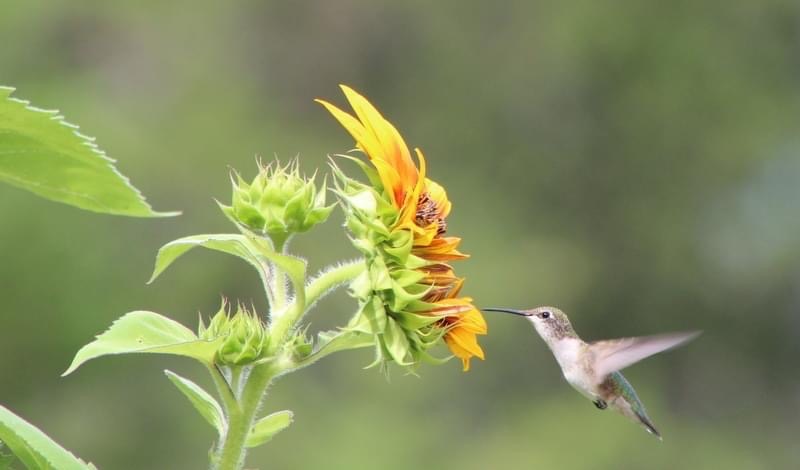
Maine Home Garden News September 2022
In This Issue:
- September Is the Month to . . .
- Maine Collecting Unwanted Pesticides Free of Charge
- Hermit Thrush
- Game Review
September Is the Month to . . .
By Sandra Miller, Penobscot County Master Gardener Volunteer
Wow, September already. It really hit home when an organization I also write for asked for Halloween articles – and as I sat in 90-degree August heat, I realized that fall really is right around the corner. And the older you get, the more corners you seem to be turning!
September is a bittersweet gardening month. It marks the end of the height of the growing season but also is a time to turn to plan the next year’s garden. The best of our garden is rolling in – those beautiful plump tomatoes, the last of the garlic and potatoes, and of course, the ever-present squash. But don’t forget the cool season crops that you hopefully remembered to put in so you might still be getting lettuce, peas, arugula, and kale! As you pull those spent plants that gave their all to feed your family, remember the gardening season is far from over! Here are some September gardening to-dos you won’t want to forget:
- Planting! Yes, it isn’t too late! Think about your herb season for next year, and put in some fennel, lemon balm, lavender, mint, parsley, and wild strawberry! Late-season crops like lettuce, kale, and arugula can also still be put in to enjoy later this fall. It is also a perfect time to put in trees for next year and have them settle in so that they wake up ready to rumble in the spring! This late in the year, though, you do want to stop fertilizing your established trees. And also don’t forget to plant your spring bulbs – what is more heartwarming than seeing those crocuses coming up through the snow?
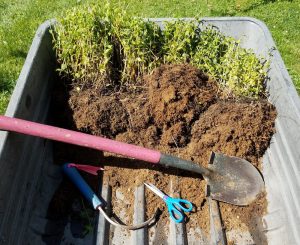 Take cuttings of plants you’d like to propagate, dig and store tender “bulbs”, and move perennials that might not be precisely where you want them. Have plants that are too big or too crowded? This is the perfect time to divide and transplant many of those clumps – and if you find that you still have space to be filled in that spring garden, make sure to visit your local nursery to see if they happen to have that perfect plant on end of season sale!
Take cuttings of plants you’d like to propagate, dig and store tender “bulbs”, and move perennials that might not be precisely where you want them. Have plants that are too big or too crowded? This is the perfect time to divide and transplant many of those clumps – and if you find that you still have space to be filled in that spring garden, make sure to visit your local nursery to see if they happen to have that perfect plant on end of season sale!- As you are thinking about your garden for next season – don’t forget to plan for wildlife. Adding some native plants, see Bulletin #2500, Gardening to Conserve Maine’s Native Landscape: Plants to Use and Plants to Avoid, to the garden is a great way to provide natural food and shelter for the feathered and furred friends living near your garden. Consider putting up some bird boxes, cleaning the ones that you already have up, and adding some bee and bat boxes to your yard as well!
- Some things are best trimmed and cleaned up now, although lots of things can wait until later in the season. But this is a great time to trim up your hostas and lily scapes. And if you are planning to throw them into the compost pile – don’t forget to do a final turning for the year first – September is a perfect time to do that chore which can be less than pleasant in August heat.
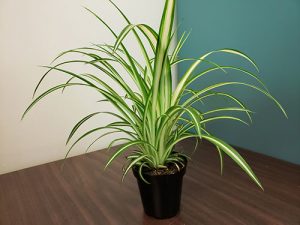 Unfortunately, as sad as it is, September is also the time to start to bring in your houseplants (pdf). Somehow, there was always more room for them in March than when I try to fit them back on the same window sills! It will take some time for them to adjust to the new light and humidity levels in the house, so don’t fertilize them until late winter or early spring again. Before you bring them in – check them over closely for signs of disease and insect hitchhikers! See Bulletin #2613, Tips for Growing Houseplants in Maine: Controlling Insects and Disease in Houseplants. No one likes to find an army of ants with a bevy of caterpillars wandering through the kitchen the day after the plants come home to roost!
Unfortunately, as sad as it is, September is also the time to start to bring in your houseplants (pdf). Somehow, there was always more room for them in March than when I try to fit them back on the same window sills! It will take some time for them to adjust to the new light and humidity levels in the house, so don’t fertilize them until late winter or early spring again. Before you bring them in – check them over closely for signs of disease and insect hitchhikers! See Bulletin #2613, Tips for Growing Houseplants in Maine: Controlling Insects and Disease in Houseplants. No one likes to find an army of ants with a bevy of caterpillars wandering through the kitchen the day after the plants come home to roost!- And the last reminder that no one wants to discuss – is the “F” word. In September your garden can still have a lot of life left in it, so if the word comes down of an early frost or you live in a cold hollow – be proactive, and cover those plants when in doubt! Protecting plants by covering with a lightweight sheet or row cover during just a few chilly nights can sometimes extend the season a few weeks. See Bulletin #2752, Extending the Gardening Season.
It’s hard to think that winter is right around the corner, but as we fill our oil tanks, bring in the firewood, and get ready to hunker down for the duration of the year, it is a nice time to reflect on all of the beauty and bounty our garden provided over the summer months, and be thankful that we are lucky enough to have reaped its benefits. May we be lucky enough to repeat the process again for many future seasons to come while remembering that life is fragile, and we each should make the most of each moment we have on this earth. Enjoy the remainder of the season as you look to the next!
Maine Collecting Unwanted Pesticides Free of Charge
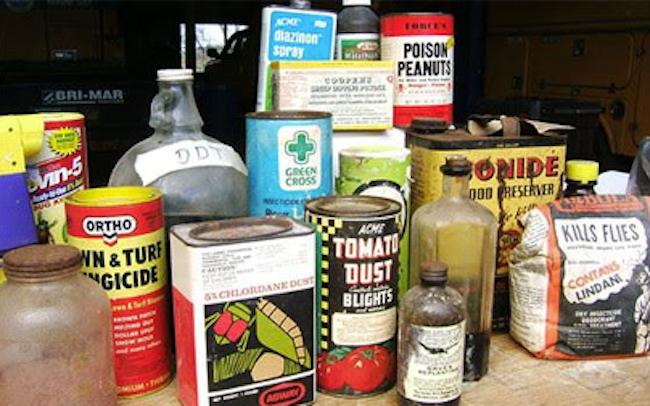
Augusta, Maine – The Obsolete Pesticide Collection Program protects Maine’s natural resources and prevents agriculture pollution by promoting the safe and proper disposal of outdated, unused, or unwanted pesticides. The program is made possible by the Maine Department of Agriculture, Conservation, and Forestry’s Board of Pesticides Control (BPC) and the Maine Department of Environmental Protection. The program is open to homeowners and family-owned farms who are encouraged to bring unwanted pesticides— including herbicides, insecticides, rodenticides, fungicides, and similar products used in agricultural production or around the home to collection sites in Presque Isle, Bangor, Augusta, and Portland.
- The next obsolete pesticide collection days will be held during October 2022, one day each in Presque Isle, Bangor, Augusta, and Portland.
- More details coming soon, including drop-off locations.
- Pre-registration is required by September 26 to participate, drop-ins are not permitted.
Details including registering and supplying the obsolete pesticides inventory form, a list of banned and unusable products, storage and transportation guidelines, and other disposal options are found on the Board of Pesticide Control website, Obsolete Pesticide Collection.
About Maine’s Obsolete Pesticide Collection Program
Removal of obsolete and unwanted pesticides is important for protecting the public, wildlife, and environmental health. Improper pesticide handling and disposal, such as placing it in the trash or pouring it down the drain, can contaminate land and water resources. The Maine Obsolete Pesticide Collection Program ensures that they are handled properly. Since 1982, the program has saved more than 250,000 lbs. of pesticides from entering the waste stream. Collected pesticides are taken to licensed, out-of-state disposal facilities by the federal Environmental Protection Agency. Learn more on the Board of Pesticide Control website.
Information in this newsletter is provided purely for educational purposes. No responsibility is assumed for any problems associated with the use of products or services mentioned. No endorsement of products or companies is intended, nor is criticism of unnamed products or companies implied.
Hermit Thrush
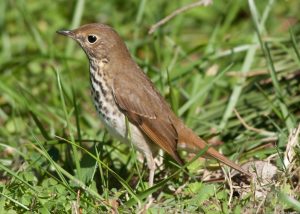
By Doug Hitchcox, Maine Audubon Staff Naturalist
As fall migration ramps up, birders should expect to see summer residents packing up and getting ready to move to their wintering ranges. The Hermit Thrush is one such migrant, a visually unassuming bird that has a recognizable and flute-like song often heard throughout northeastern woods. They are not typical visitors to feeders but as migration begins, they can be found foraging in backyards where there are berries on shrubs or trees. Try adding native plants like Common Elderberry (Sambucus canadensis) or Northern Spicebush (Lindera benzoin) to your garden to help feed Hermit Thrushes!
For more on the importance of Maine native plants to support birds and other wildlife, visit Maine Audubon’s “Bringing Nature Home” webpage.
Game Review
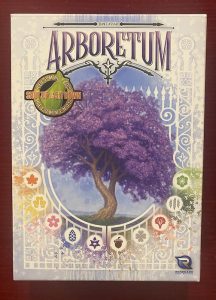
If you haven’t tried board games in years, you might remember them as tedious and not much fun. If you’re in on the secret, however, you know we are now living in a Golden Age of board gaming. A hobby explosion that started 20 years ago with games like Settlers of Catan (now just Catan…) and Ticket to Ride has ballooned into a full-blown movement—hundreds of themes, game mechanics, and styles are available at local or online retailers to suit almost any taste. And your UMaine Cooperative Extension game corner would like to introduce a few!
Arboretum
(2-4 players, aged 8/10+) is a portable, infinitely classy card game with gorgeous artwork, simple rules, agonizing choices, and brain-burning strategy, designed by Dan Cassar and most recently published by Renegade Game Studios. The gameplay is deceptively simple, starting with whomever last watered a plant: you draw two cards into your hand from the deck or a discard pile, you “plant” a card in your arboretum, and you discard a card from your hand into a discard pile, where it’s available to all. The cards each have a specimen of an ornamental tree species, valued from 1 to 8. When the deck is empty, you “judge the beauty” of each arboretum (i.e., score them!).
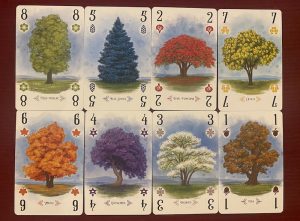
The catch? Only the player with the highest value of cards of a particular species *still in hand* at the end can score that species in their arboretum. You may have a lovely run of maples that you can’t score because you have no Maples left in your hand. Or someone else may have a higher value Maple in their hand, meaning they score Maples. You can guess what species others are shooting for by what they place and what they discard, and that’s where strategy begins.
At some point, you’ll find yourself having to play or discard something you know an opponent wants. Do you play your last Willow to make your run more valuable, hoping you draw another to hold in hand? Do you hang onto it to ensure you can score Willows at the end? Do you keep an Olive you don’t want because you can see an opponent is making a valuable Olive run and you want to cut them off at the end game? It’s excruciating. And it’s wildly fun if you like difficult decisions in a game.
If you’ve only played time-honored standbys at camp like Monopoly or Sorry!, I recommend some learning games like Catan and Ticket to Ride to ease into modern gaming; Arboretum is not one for green beginners, so to speak! But if you like hobby games and you’re looking for a new challenge, or if you just love looking at beautiful artwork, give Arboretum a try. It’s evergreen at our house.
Do you appreciate the work we are doing?
Consider making a contribution to the Maine Master Gardener Development Fund. Your dollars will support and expand Master Gardener Volunteer community outreach across Maine.
Your feedback is important to us!
We appreciate your feedback and ideas for future Maine Home Garden News topics. We look forward to sharing new information and inspiration in future issues.
Subscribe to Maine Home Garden News
Let us know if you would like to be notified when new issues are posted. To receive e-mail notifications, click on the Subscribe button below.
University of Maine Cooperative Extension’s Maine Home Garden News is designed to equip home gardeners with practical, timely information.
For more information or questions, contact Kate Garland at katherine.garland@maine.edu or 1.800.287.1485 (in Maine).
Visit our Archives to see past issues.
Maine Home Garden News was created in response to a continued increase in requests for information on gardening and includes timely and seasonal tips, as well as research-based articles on all aspects of gardening. Articles are written by UMaine Extension specialists, educators, and horticulture professionals, as well as Master Gardener Volunteers from around Maine. The following staff and volunteer team take great care editing content, designing the web and email platforms, maintaining email lists, and getting hard copies mailed to those who don’t have access to the internet: Abby Zelz*, Annika Schmidt*, Barbara Harrity*, Cindy Eves-Thomas, Kate Garland, Mary Michaud, Michelle Snowden, Naomi Jacobs*, Phoebe Call*, and Wendy Roberston.
*Master Gardener Volunteers
Information in this publication is provided purely for educational purposes. No responsibility is assumed for any problems associated with the use of products or services mentioned. No endorsement of products or companies is intended, nor is criticism of unnamed products or companies implied.
© 2022
Call 800.287.0274 (in Maine), or 207.581.3188, for information on publications and program offerings from the University of Maine Cooperative Extension, or visit extension.umaine.edu.
The University of Maine is an EEO/AA employer and does not discriminate on the grounds of race, color, religion, sex, sexual orientation, transgender status, gender expression, national origin, citizenship status, age, disability, genetic information or veteran’s status in employment, education, and all other programs and activities. The following person has been designated to handle inquiries regarding non-discrimination policies: Director of Equal Opportunity, 101 Boudreau Hall, University of Maine, Orono, ME 04469-5754, 207.581.1226, TTY 711 (Maine Relay System).
